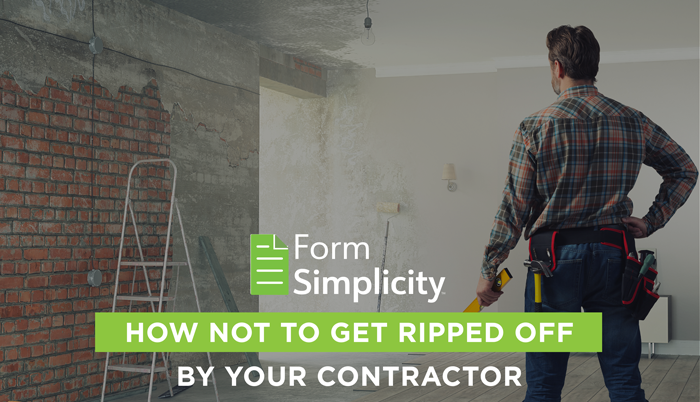
How would you feel recommending a contractor and finding out the work which was completed or semi-completed was not done properly? Do you think that it would affect your future business and recommendations? It certainly can. And it happens more often than you think.
This does not just happen to our clients. It happens to real estate agents all the time. I spoke this week with a real estate agent that inherited a condo from her mother. She decided to completely gut and renovate it. She went to the condo office to ask who they recommended since they have firsthand knowledge of the contractors that do a lot of work in the building. The office manager recommended a contractor that had renovated 3 units in her building in the same line. She went to take a look at them and was impressed with his work. Sounds good so far, right?
She signed an agreement, and he began his work by demolishing the whole inside of the condo. Now, normally there are notices put up on the door indicating that permits were pulled. She did not see any and asked him where the permits are. He said that he did not pull any. Fear set in. She looked him up online and found out that the name of his company, which is on the contract along with his license number, is no longer active. This contractor had no license to do work. She immediately fired him and requested her deposit back. How much deposit did she give him? $42,000. Yikes! Has she seen one penny of it back? If you said no, you guessed right.
Then the agent found out that the contractor was banned from the building for previous shoddy work. The big question now is, why did the condo office manager refer a contractor that was banned by the condo association? Now she hires an attorney. The cost and aggravation of pursuing this and the probability of getting her deposit returned appear to be futile.
Nothing turns the excitement of your dream remodel into a nightmare like a bad contractor.
Here are the 8 essential tips for selecting a contractor that won’t leave the home underwater.
1. Make sure the contractor you hire has an active license in your state.
This is number one. Go online and search for their name. Make sure the company’s name is active and look for the names of the people within the company. Sometimes, the person you are hiring is not a contractor and is working under the license of someone else. Know this upfront before you make a commitment to avoid potential risks.
You want to make sure that the person you are dealing with is a licensed professional with work under their belt in your state. If anything goes wrong, you can file a complaint with the City or State licensing bureau. If any issues arise while the work is being performed, you can bring in an Inspector to make sure it is being done correctly and according to the local building standards.
When you hire someone to remodel a home and they don’t have a license, it is going to be very difficult, if not impossible, to take any recourse that will bring you a satisfying result. By hiring a licensed person, at least you know the licensing state, has done some backgrounds check on them.
2. Check their online Reputation and Reviews
Most of us today, learn about those we work with by what people are saying online. Check out their reviews, and if there have been any complaints filed against them. The Better Business Bureau (BBB) is a good place to start.
3. Look into your contractor’s background
Whomever you decide to hire, make sure that you can trust that person. That can be a very big endeavor, yet there are steps you can take to minimize your risk.
There are many good and bad people that do not want the headache and expense of getting a contractor’s license, so they work under the license of another person. Know this beforehand and check out the work they have done.
Here’s an example of why that is important: A real estate agent who purchased a condo met a contractor doing work in the same building. The contractor told her that he gave his license information to the condo office, and the agent trusted that (or else he would not be working there, right?) So, she hired him to remove and re-tile her entire condo.
When the contractor and his worker said they had finished the job, she went to go check. The place was covered in dust and was not completed. Upon investigating further, the agent found out that these men working in the building were ex-felons without a license. They threatened her with her life if she did not pay them, so she did. Lesson learned.
Know as much as you can about the background of the person you are entrusting with keys, and the remodel of your home before making a decision.
4. Interview the contractor
Find out if he or she will be the one doing the job and ask how hands-on they will be. Will they be doing the work themselves or hiring others under their license to do the work? Does the contractor you hire plan on showing up every day to make sure the job is completed on time and correctly, or will they be performing multiple jobs at once and only available via phone or text?
Will the contractor you hire commit to a start date? I have seen more than once a contractor saying they will begin work next week, take your deposit, and then call to postpone your job. This is common practice. Find a contractor who has a track record of showing up and completing the job within an agreeable time frame.
Yes, some things can get out of our control, like weather, building inspectors and unforeseen problems. Still, you want a contractor who shows up when they say they are going to start the job.
5. Check out their referrals
Rule number one is to go see their work when possible. At the very least, definitely call to verify their references. Many contractors will show you photos of the work they have done. Yet, how do you know if it was truly their work?
6. Get multiple estimates
Get estimates from at least 3 different contractors. I believe that you get what you pay for in life. So remember, the cheapest bid does not mean it is the best. Many times, the cheapest bid ends up being the most expensive due to delays and adjustments in price that the contractor adds during the course of the project.
7. Structure payments so it is a win-win.
Consider paying for the materials and supplies up front. Either you can buy them, or they can purchase them and provide receipts. Also, check that you are paying for items that were purchased for your job and not for anyone else’s. Pay for work completed during various phases of the project. For example, the first deposit is made once 1/3 of the job is completed, then 1/2, then 3/4 and a final payment once completed. This can help protect you from the contractor holding all the cards (money) and then delaying the start or completion of the remodel.
8. Make sure permits are pulled and closed when the job is finished.
I can’t tell you how many times prior to a closing, the title company finds that there is still an open permit for a job that was done years ago. It usually shows up as a lien on the property. It can delay the closing and cause undue aggravation. So, make sure the permits are closed and check with your city, county or local municipality that this has been done when the work is completed.
Wish there was a foolproof method to prevent contractor nightmares. By following the above tips, this can help prevent or alleviate any potential stress down the line. For additional concerns, consider speaking with an attorney specializing in condo and home construction so you take every step to protect yourself BEFORE the remodel or construction begins.
Written for Form Simplicity by Janice Zaltman, a Realtor, LEED AP, Marketing Coach and Writer with more than 20 years of experience in the sales, marketing and media fields.




